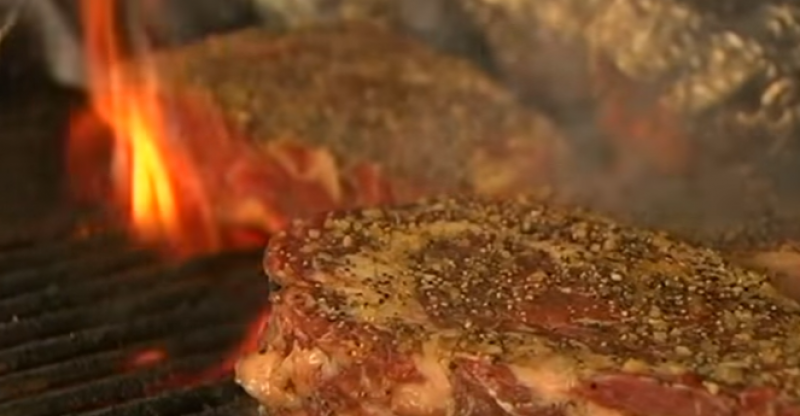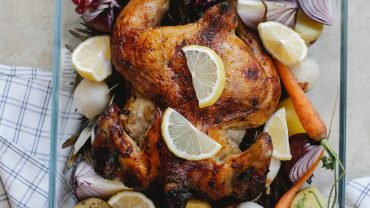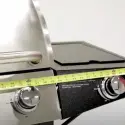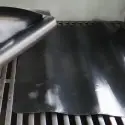How To Put Out Grill Fire
How To Put Out Grill Fire
How To Put Out Grill Fire? This is often difficult for people to understand and come through the issue! When fat drippings and grease from your meal pass through the grates and into your flame, it causes a flare-up. Flare-ups may quickly spiral out of control if you’re not paying attention, especially if fat and grease continue to stream into the flame.
The primary reason your food burnt is the grease gathered on the drip pan located underneath the burner. Have you ever thought about where this flammable material comes from? It comes from the residue that drips from the food you are cooking in the grill, and if the lower plates are not treated right, you can get into a similar problem that we have explained above!
If your flame has grown too large and out of control, here are the actions to follow.
- If you are utilizing a gas grill, turn off the burners. So that no additional gas is introduced to the fire, you’ll want to turn off the fuel supply. If you can securely reach the knobs, do so.
- Put out the fire by smothering it rather than pouring or spraying water on it. This will disperse the burning grease across a larger area. Use salt, baking soda, or sand to blanket and smother the flame.
- Shut all vents and close the lid to help cut off oxygen to the flames.
- Use a fire extinguisher to douse your grill if the flames haven’t died down after around 30 seconds.
- If your propane tank is on fire, get out of the area as soon as possible and contact emergency services.
How To Avoid And Manage Flare-Ups To Put Out Grill Fire
You may take certain precautions and measures to help minimize or lessen the likelihood of flare-ups on your barbecue. Here are some tips for preventing flare-ups and managing them when they do occur.
- During possible, keep the lid open, especially when searing. Grilling with the lid closed is sometimes excellent, but heat cannot build up and increase with the cover open. If you want to drastically limit the risk of flare-ups, keep the lid open at least while you sear on high heat.
- Don’t stuff your grill with too much food. It’s not a terrible thing to cook food close to one another; nevertheless, you can’t fill the entire surface area of the grill with food. You’ll want to shift your food away from the flame if a flare-up occurs.
- If necessary, trim fat. Because fat substantially increases the flavor of our meals, this one is a little bit of a balance. However, if you’re working with a cut of meat that has a lot of fat on it, it’s a good idea to trim it to avoid flare-ups.
- Limit the number of sauces, oils, and marinades you use. Similarly, drippings from any sauces, oils, or marinades you may use to coat your food might lead to a flare-up if not used in moderation.
- Try to stay out of the wind. It may seem contradictory because a strong blast of wind may extinguish a gas grill’s flame, but avoiding the wind can also minimize the likelihood of flare-ups. This is because wind drives oxygen into the vents and between the grates of your grill, which might contribute to igniting a flare-up.
- If grease begins to pool, burn it away. Remove your food (or place on an elevated warming rack) if you observe pools of oil and raise your heat to be high with the lid open until the grease has burnt off. Then return your dish to the grill and finish cooking!
- Do not use water as a spray. Spraying water on a grease fire may make things a lot worse, turning a controllable fire into a deadly one.
The Importance Of Grill Cleaning To Put Out Grill Fire
Maintaining your grill properly can also help you avoid a grill fire or flare-ups during your next cook. If you don’t take an extra 5 minutes after you’ve finished cooking to clean your grill, it might have long-term consequences if you’re not cautious.
You don’t want grease and food particles to adhere to your grill, then light and catch fire the next time you cook. At the very least, you should scrub your grill grates after each usage with a grill brush.
However, you should go one step ahead and use a paper towel or cloth to clean any accumulated oil off of your grates and grill. It only takes 5 mins and will make your life easier and improve the flavor of your meals in the future. You should deep clean your grill every six months or so, making sure to scrape and clean every nook and corner.
Things To Do If Your Grill Catches Fire
If, in any case, your grill catches fire and your food is still inside, the first thing you have to do is to save your food. How will you do it? Well, you have to immediately transfer the food to the rack. However, this is not an easy task, and you have to take necessary precautions for that, such as using long-handled tongs.
You can also take out the food and replace it when the fire is control. Moreover, you have to place the grill where the fire extinguisher is nearby, and the place is not covered from all sides.
Although everyone knows it, we are explaining again why you should put the grill outside the kitchen for your better understanding. Your kitchen must be located in the middle of your house. And it should have a lot of things that can catch fire and burn the house ultimately. When there the grease in your grill catches fire, sometimes it gets uncontrollable, and it can be very dangerous if it is placed in the middle of your kitchen.
Therefore, it is always recommended that grilling activities be done outside the living area; a garden or a marble floor would be a good option.
Conclusion
Hopefully, you won’t have to be dealing with them frequently, but you’ll know how to put out a grill fire if you do.
Taking the preventative procedures detailed above is the best way to avoid grill fires and flare-ups. It also helps if you just pay attention to your grill! A little amount of care and attention may go a long way toward ensuring that your surroundings are secure.








